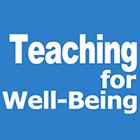Learning and Teaching For Wellbeing | About Students
 College brochures typically display images of happy, healthy students in diverse clusters of smiling faces. But that upbeat image does not reflect the reality for many young adults in higher education. Stress, anxiety, exhaustion, depression, and loneliness are all at record levels and continuing to rise each year. For university educators to remain effective, we must recognize the challenges that are affecting their academic performance. The purpose of these resources is to deepen educators' knowledge, strengthen their motivations and enrich their skills to support learners' wellbeing and benefit their personal and academic success.
College brochures typically display images of happy, healthy students in diverse clusters of smiling faces. But that upbeat image does not reflect the reality for many young adults in higher education. Stress, anxiety, exhaustion, depression, and loneliness are all at record levels and continuing to rise each year. For university educators to remain effective, we must recognize the challenges that are affecting their academic performance. The purpose of these resources is to deepen educators' knowledge, strengthen their motivations and enrich their skills to support learners' wellbeing and benefit their personal and academic success.
HOME | About students | about faculty | Instructional mETHODS | Resources | AllieS (COMiNG SOON)
What Do We Know About Our Students?
Findings from studies of university students
This page provides links to data from several sources that illuminate the wellbeing challenges that today's college students experience. This information can help motivate faculty to recognize and respond to the likelihood that significant numbers of the students in their classes are working through serious challenges to their wellbeing that can affect their capability to learn.
Findings are provided from:
- The Healthy Minds Study, 2020 (Cal Poly students)
- American College Health Association (ACHA) (multiple years, national samples)
- Beginning College Survey of Student Engagement
If the findings provided below are motivating, you're invited to browse a collection of instructional methods that can be incorporated into teaching to better support the whole learner. More information is available on the Instructional Methods for Wellbeing pages.
Healthy Minds Study
In fall 2020, in the middle of the pandemic year, Cal Poly commissioned a survey of our students by the Healthy Minds organization. The findings provide a valuable insights into our students' self-reported measures of wellbeing.
Self-check on assumptions and perceptions of Cal Poly students
How accurate are your assumptions and perceptions about Cal Poly students' mental health? This is an opportunity to find out. Before reviewing the Health Minds Study findings, consider taking 5-6 minutes to complete a quick survey to record how you expect that students responded to a small set (12) of questions from the study. Here's the link to the survey:
Survey: Perceptions of Cal Poly Students' Wellbeing
When you have completed the survey, you will receive an email with your responses. With that in hand, you can go to the Healthy Minds Study results summary page linked below and compare your responses to the actual results. You will be able to see where you are fairly accurate, where you are overestimating and where you are underestimating.
Healthy Minds Study Findings Summary
National College Health Assessment
The American College Health Association has conducted national surveys of college students called the "National College Health Assessment" for more than a decade. Findings about college students' mental health and wellbeing provide insights into the challenges that young adults bring to their university lives. In addition to findings from large national samples of college students, data from Cal Poly students' on the same survey provide useful comparisons and greater clarity about our own students.
National College Health Assessment Findings
Optimism and Weariness: Results for Students Entering College 2021
Beginning College Survey of Student Engagement (BCSSE)
Results from BCSSE 2021 offer insight into entering students’ high school experiences and their expectations for the coming year. COVID-induced distance learning challenged students academically, technologically, and psychologically. The pandemic required some to take on new responsibilities at home while managing unfamiliar expectations to finish high school. Key findings indicate that significant numbers of college students are beginning their freshman year with high levels of mental and emotional exhaustion, feelings of loneliness, symptoms of depression, and with challenges to sleep and concentration.



